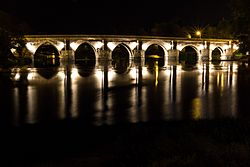Roman bridge of Lugo facts for kids
Quick facts for kids Roman bridge of Lugo |
|
|---|---|
| Puente Romano de Lugo | |
| Lugo Near Lugo in Spain |
|

The Roman bridge at night
|
|
| Type | Ancient Roman bridge |
| Length | 104 metres |
| Site information | |
| Open to the public |
Yes |
| Site history | |
| Built | 1st century |
| Built by | Roman culture |
| Materials | stone and slate |
The Roman bridge of Lugo is an old bridge in Lugo, Galicia, a region in Spain. It crosses the Minho river. This bridge was first built by the Romans a very long time ago.
Over the years, the bridge has been rebuilt and repaired many times. This shows how important it has been for travel and connecting places.
Until 2012, cars and other vehicles could drive across the bridge. But then, it was changed to be only for people walking. This means no more cars! The old road surface was replaced with new stone to make it look more like it did in Roman times.
Contents
Exploring the Roman Bridge of Lugo
The Roman bridge of Lugo is a cool example of ancient Roman building. It's a great place to visit if you're interested in history.
What Makes It Special?
- Ancient History: It was built in the 1st century, which is almost 2,000 years ago!
- Long and Narrow: The bridge is about 104 metres long and 4 metres wide.
- Built to Last: The Romans used strong materials like stone and slate.
- Pedestrian Friendly: Now, you can walk across it safely and enjoy the views.
How the Bridge Changed
The bridge has seen many changes over its long life. It was first built by the Romans to help people and goods cross the Minho River. This was important for trade and travel in their empire.
Later, as cities grew, the bridge was updated. It was used by many different types of traffic. In 2012, a big change happened. The bridge was closed to cars. This made it a peaceful place for people to walk and enjoy the river. The new stonework helps it look more like its original Roman design.
Images for kids
See also
 In Spanish: Puente romano de Lugo para niños
In Spanish: Puente romano de Lugo para niños
 | Valerie Thomas |
 | Frederick McKinley Jones |
 | George Edward Alcorn Jr. |
 | Thomas Mensah |



